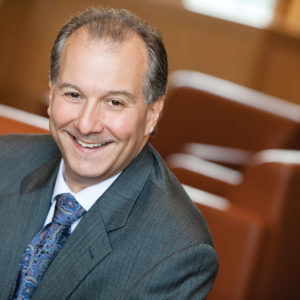
This year, the School of Engineering & Applied Science launched “Engineering the Future,” a podcast in which we explore some of the world’s most complex challenges and investigate how engineers are working to solve them. As host, I sit down with those engineers — many of them our talented faculty, students and alumni — for a deep dive into these global problems and solutions. In our first episode, I spoke with faculty members Vijay Ramani and Richard Axelbaum about how their research advancements are shaping the future of energy worldwide.
So what does the future have in store for us in regard to energy resources, consumption and technology?
Our society is dependent on electricity and fuel for everything from refrigeration to transportation. The humanitarian disasters that ravaged the U.S., Mexico, and the Caribbean last year served as a stark reminder of this dependence. And to feed that dependence, our world still relies on easy, cheap access to fossil fuels and technologies that were first developed more than a century ago.
But over the last several decades, we’ve come to understand the environmental and health impacts of the extensive use of combustion-based energy sources.
The bottom line is that our energy sources and applications will truly disrupt the quality of life on earth if we don’t find alternative solutions.
Today our critical infrastructure depends on reliable energy. While renewable energy technology has advanced significantly, at scale they do not approach the reliability we have come to expect. As a result, we are not going to stop burning fossil fuels anytime soon — both in the U.S. and worldwide. The energy requirements are too extensive, the deployed infrastructure is too expensive to replace quickly, and renewables are still a long way from providing the reliable, 24/7 energy needed at scale. When we consider countries like India or China, we know coal is going to be an important energy source for their growing economies, and these energy demands will exist regardless of consequence.
The optimistic news is that researchers here at Washington University and elsewhere are developing various innovations to help protect our health and environment amidst these realities. For example, flow batteries, which store electricity in chemical solutions while charging and release electricity, present new opportunities to improve storage for renewable energy resources. Advanced storage capabilities will enable governments and businesses to diversify their energy mix more effectively. Current research aims to make them more affordable and perform at grid-scale. Here at WashU, our faculty members are developing a new membrane that can be used in these batteries to increase versatility, while also lowering costs.
Through an engineering lens, we can also think about coal as a resource and carbon burning differently. If you’re not just producing electricity, but also producing carbon dioxide that is captured and put to use for other systems, you can leverage coal in a more environmentally efficient way. For example, WashU faculty have demonstrated that new technology can capture CO2 from power plants to be used for enhanced oil recovery and sequestered underground and out of the atmosphere.
As engineers, our goal is to make sure the world has as many options as possible to dramatically impact the future of energy.
To catch the full podcast episode, you can visit this link. In addition, subscribe to our podcast on iTunesto listen to future episodes.
Read more from Aaron Bobick on the School of Engineering & Applied Science website.
Comments and respectful dialogue are encouraged, but content will be moderated. Please, no personal attacks, obscenity or profanity, selling of commercial products, or endorsements of political candidates or positions. We reserve the right to remove any inappropriate comments. We also cannot address individual medical concerns or provide medical advice in this forum.